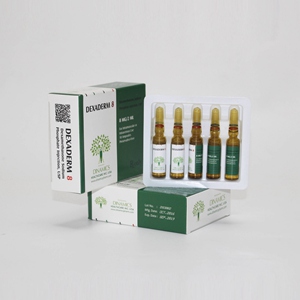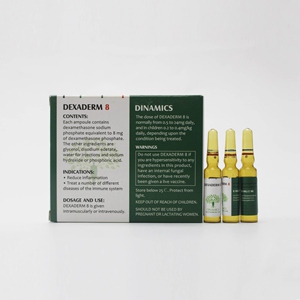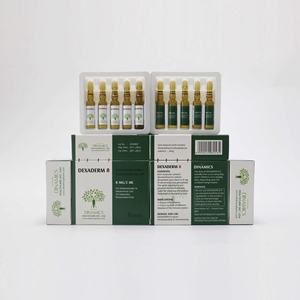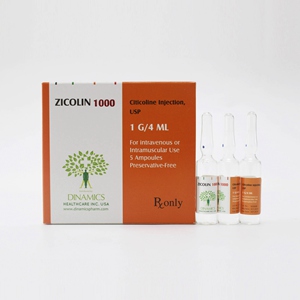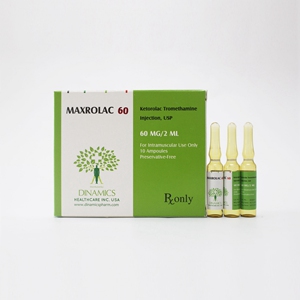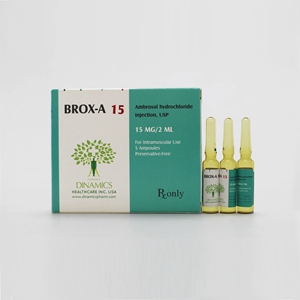Dexamethasone Sodium Phosphate Injection,USP
QUICK DETAILS:
DEXADERM 8 Content:
• Each ampoule of this medicine contains dexamethasone sodium phosphate equivalent to 8 mg of dexamethasone phosphate as the active ingredient.
• The other ingredients are glycerol, disodium edetate, water for injections and sodium hydroxide or phosphoric acid.
DEXADERM 8 Character:
DEXADERM 8 is a clear colourless solution which comes in a brown glass ampoule containing 2 ml of solution.
DEXADERM 8 Pack:
5 ampoules in a plastic tray, 2 trays in a box.
DESCRIPTION
1. What DEXADERM 8 is and what it is used for
Dexamethasone Sodium Phosphate is a glucocorticoid and belongs to a group of medicines called corticosteroids.
Corticosteroids are hormones that are found naturally in your body that help to keep you healthy and well. Boosting your body with extra corticosteroid, such as Dexamethasone, is an effective way to treat various illnesses involving inflammation in the body. Dexamethasone lowers inflammation, which could otherwise go on making your condition worse. You must take this medicine regularly to get maximum benefit from it.
DEXADERM 8 can be used to:
•Reduce inflammation
•Treat a number of different diseases of the immune system
2. What you need to know before you take DEXADERM 8 Do not use DEXADERM 8 if you:
-Are hypersensitivity to any ingredients in this product. The signs of an allergic reaction include a rash, itching or shortness of breath
-Have an internal fungal infection.
-Have recently been given a live vaccine such as smallpox or polio/sabin, unless you are being given the dexamethasone phosphate (as sodium) for replacement therapy.
Take special care before taking DEXADERM 8:
-Tell your doctor or pharmacist if you have allergies to:
• any other medicines
• any other substances, such as foods, preservatives or dyes.
-Tell your doctor if you are pregnant or intend to become pregnant. Like most corticosteroid medicines, dexamethasone phosphate (as sodium) is not generally recommended for use during pregnancy. Your doctor will discuss with you the possible benefits and risks of using DEXADERM 8 during pregnancy.
-Tell your doctor if you are breast-feeding or plan to breast-feed. DEXADERM 8 may pass into breast milk, and there is a possibility that the breast-fed baby may be affected. Therefore, DEXADERM 8 is not recommended for use during breast-feeding.
-Tell your doctor or pharmacist if you have been given any vaccines recently.
-Tell your doctor or pharmacist if you have or have had any medical conditions, especially the following:
• diabetes, a disorder of sugar metabolism or control
• current of recent infections
• heart failure or a recent heart attack
• kidney disease
• liver disease
• thyroid disease
• inflammation of the bowel wall or other bowel problems
• high blood pressure
• eye diseases, including infections, ulcers or allergies
• epilepsy, seizures or convulsions
•a stomach ulcer
•intestinal disease
•weak or brittle bones
•myasthenia gravis, a muscle wasting disease.
Taking other medicines
Tell your doctor or pharmacist if you are taking or using any other medicines, including any that you buy without a prescription from your pharmacy, supermarket or health food shop. Some medicines and DEXADERM 8 may interfere with each other. These include:
•barbiturates or phenytoin, medicines used to treat epilepsy
•aspirin, and other non-steroidal anti-inflammatory medicines, especially phenylbutazone
•insulin or other medicines for the control of sugar in the blood
•oestrogens and other oral contraceptives
•anti-thyroid medicines used to treat an over active thyroid gland
•fluid tablets, particularly frusemide and thiazides or other medicines affecting the kidneys
•anticoagulant medicines (medicines to prevent blood clots), such as warfarin or heparin
•any recent vaccinations or immunisations
•cyclosporin, a medicine used to prevent transplant rejection
•rifampicin or amphotericin, medicines used to treat infections
•digoxin, a medicine used to treat heart conditions
•aminoglutethimide, a hormone used treat breast cancer.
These medicines may be affected by DEXADERM 8 or may affect how well it works. You may need different amounts of your medicine, or you may need to take or use different medicines. Your doctor or pharmacist will advise you. Your doctor and pharmacist may have more information on medicines to be careful with or avoid while you are being given DEXADERM 8.
If you stop having DEXADERM 8
It can be dangerous to stop having this medicine suddenly. If you need to stop this treatment, follow your doctor’s advice. He or she may tell you to lower the amount of medicine you are having gradually until you stop having it altogether. If you stop having this medicine too quickly, your condition may get worse.
You may also feel a ‘withdrawal symptom’. These may include headache, problems with your vision (including pain or swelling in the eye), feeling or being sick, fever, pain in your muscles and joints, swelling in the inside of your nose, weight loss, itchy skin and conjunctivitis.
Driving or Operating a machine
As with other corticosteroid medicines, DEXADERM 8 may cause dizziness in some people. Be careful driving or operating machinery until you know how DEXADERM 8 affects you.
DIRECTION
1.How to take DEXADERM 8
How much is given
The dose of DEXADERM 8 is normally from 0.5 to 24mg daily, and in children 0.2 to 0.4mg/kg daily, depending upon the condition being treated. It may be given as a course of injections or as a single dose. Your doctor will decide what dose will receive. This depends on your condition and other factors, such as your weight.
As soon as an improvement in your condition is noticed, the dosage should be adjusted to the minimum required to control the symptoms.
How it is given
DEXADERM 8 is given intramuscularly or intravenously.
DEXADERM 8 should only be given by a doctor or nurse.
2. Possible side effects
Like all medicines, this medicine can cause side effects, although not everybody gets them.
Dexamethasone can also cause side effects when you stop using it. See If you stop having DEXADERM 8.
Serious side effects: tell a doctor straight away.
Steroids including Dexamethasone can cause serious mental health problems. These are common in both adults and children. They can affect about 5 in every 100 people taking medicines like Dexamethasone. These include:
•Feeling depressed, including thinking about suicide
•Feeling high (mania) or moods that go up and down
•Feeling anxious, having problems sleeping, difficulty in thinking or being confused and losing your memory
•Feeling, seeing or hearing things that do not exist. Having strange and frightening thoughts, changing how you act or having feelings of being alone.
If you have an allergic reaction to DEXADERM 8, see a doctor straight away
An allergic reaction may include:
•Any kind of skin rash or itching of the skin
•Difficulty in breathing or collapse
If you get any of the following side effects see your doctor as soon as possible:
•Stomach and gut problems: stomach ulcers which may perforate or bleed, indigestion, having more of an appetite than usual, diarrhoea, feeling or being sick
•Inflamed pancreas: this may cause severe pain in the back or tummy
•Problems with salts in your blood such as too much sodium or low potassium or calcium. You may have water retention
•Heart and blood problems: high blood pressure, blood clots
•Bone problems: thinning of the bones (osteoporosis) with an increased risk of fractures, bone disease, damaged tendons, damage to the joint where the injection was given
•Recurring infections that get worse each time such as chicken pox. Also, thrush
•Skin problems: wounds that heal more slowly, bruising, acne, sweating more than usual.
Burning, redness and swelling where the injection was given. This does not last long
•Eye problems: increased pressure in the eye including glaucoma, eye disorders such as cataracts, eye infections
•Hormone problems: irregular or missing periods, stunted growth in children and teenagers, swelling of the face (called a ‘Cushingoid’ or ‘moon’ face), it may affect your diabetes and you may notice you start needing higher doses of the medicine you take for diabetes, your body may not be able to respond normally to severe stress such as accidents, surgery or illness, growth of extra body hair (particularly in women), increased appetite or weight gain.
•Nervous system problems: fits or epilepsy may become worse, severe unusual headache with visual problems, being unable to sleep, feeling depressed, extreme mood swings, schizophrenia has become worse, headache or problems with your vision (including eye pain or swelling)
INGREDIENTS
Contents of the pack and other information
What DEXADERM 8 contains
•Each ampoule of this medicine contains dexamethasone sodium phosphate equivalent to 8 mg of dexamethasone phosphate as the active ingredient.
•The other ingredients are glycerol, disodium edetate, water for injections and sodium hydroxide or phosphoric acid.
What DEXADERM 8 looks like and contents of the pack
DEXADERM 8 is a clear colourless solution which comes in a brown glass ampoule containing 2 ml of solution.
5 ampoules in a plastic tray, 2 trays in a box.
STORE
How to store DEXADERM 8
DEXADERM 8 must not be used after the expiry date ‘EXP’ shown on the container.
Keep out of the reach and sight of children. Store below 25℃, protect from light.


